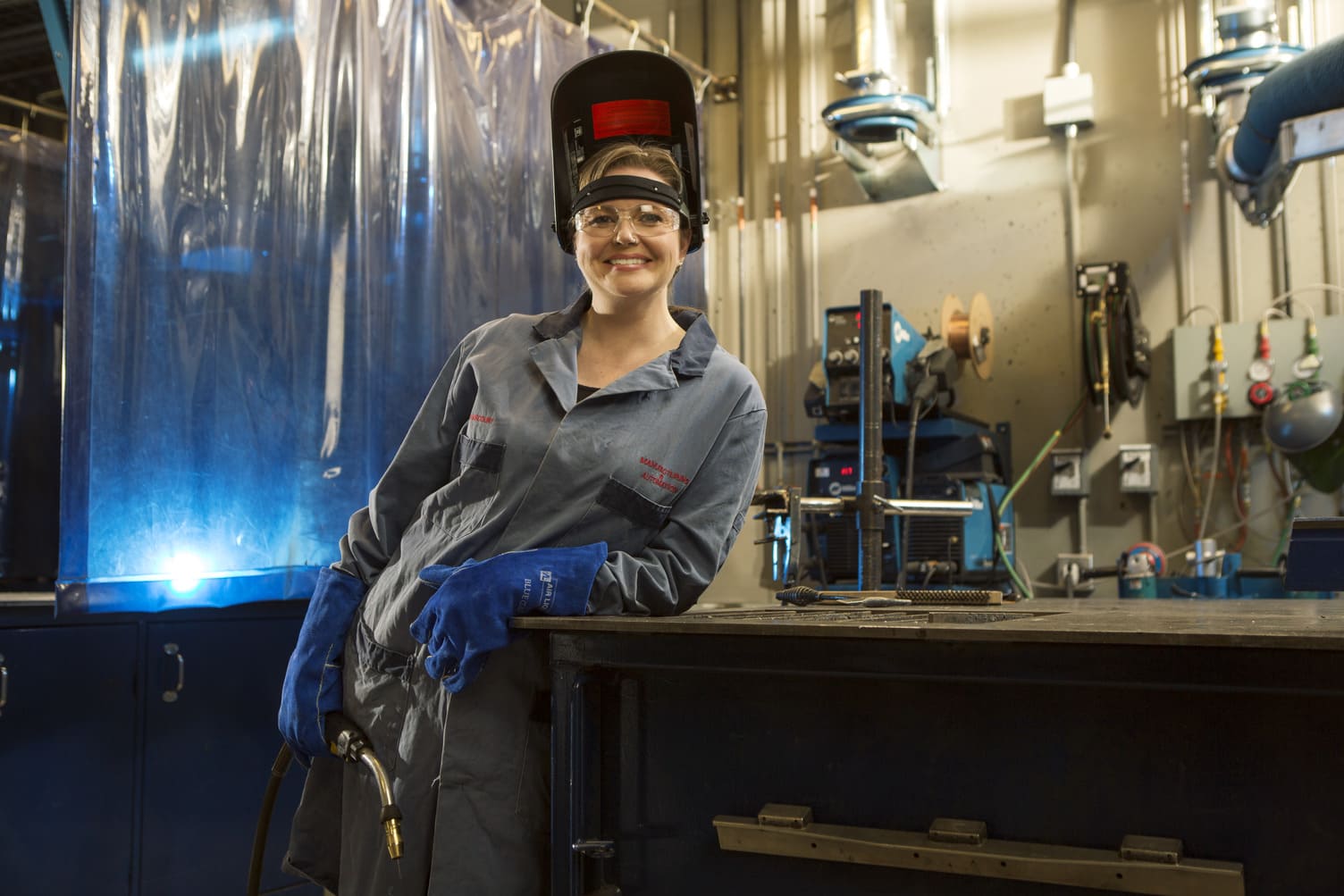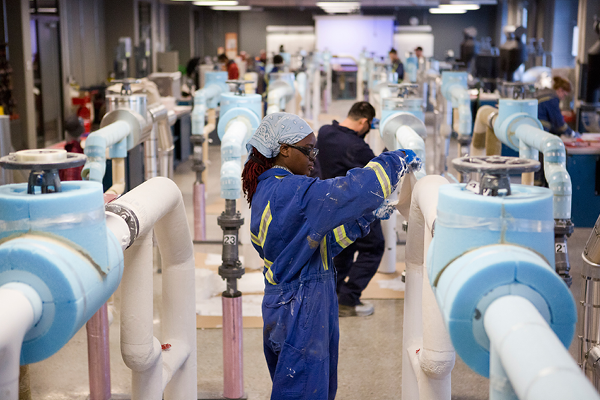On this page:
Overview
Learn to apply, remove and repair thermal and acoustical insulation on all types of commercial and industrial equipment – such as calcium silicate, glass foam, mineral wool, Styrofoam and fibreglass.
Throughout your career, you'll:
- read and interpret drawings and specifications to determine insulation requirements
- select the type and amount of insulation to be installed
- determine the method of securing the insulation according to different factors like the type and shape of the surface, whether the equipment is cold or hot, if the equipment is inside or outside or what the equipment is going to be used for
- measure, cut and fit insulating material and coverings to the required shape and dimension
- install vapour barriers
- finish insulated surfaces by applying metal cladding, canvas, plastic sheet or cement.
Insulators are skilled tradespeople comfortable working at heights, collaborating with others and working independently. This line of work is most fulfilling for those who enjoy working with their hands and are driven by quality, precise work.
To succeed in this trade, you should:
- enjoy creative problem-solving
- pay attention to detail and produce precise work
- have manual dexterity
- have the strength and stamina to work with heavy glass materials
- be comfortable working at various elevations, in confined spaces and in hot and cold environments
- be able to work alone or in a team environment
- be committed to maintaining safe work habits.
Upon successfully completing the required working hours and technical training periods, you'll be awarded a diploma in addition to journeyperson status by Alberta’s Apprenticeship and Industry Training.
This is a Red Seal Endorsed trade – a recognizable standard that allows tradespeople to work across Canada.
Careers and opportunities
Our graduates may work in the following occupations. Some careers require additional experience and education.
Associated National Occupational Classification (NOC) codes: 70011, 72014, 72321, 73200, 75212.
Apprenticeship training
The term of apprenticeship for an insulator (heat and frost) is three years (three 12-month periods) including a minimum of 1517 hours of on-the-job training and seven weeks of classroom instruction each year.
Year 1 | Period 1
You'll start by learning standard and specific workplace safety, tools, accessories and equipment. You will then learn hot and cold applications, dual temperature applications, math, and blueprints level one.
Training length: 7 weeks
Year 2 | Period 2
You will then learn canvas on insulated piping, ducts and equipment, pattern layouts level one, coverings, specialized applications level one, math and blueprints level two.
Training length: 7 weeks
Year 3 | Period 3
You will then learn Red Seal program, specialized applications level two, pattern layout level two, pipe rack layout as well as math and blueprint level three.
Training length: 7 weeks
Apprenticeship education performance
You must pass each section of the course and the AIT exam to succeed in apprenticeship education.
The passing grade for each period is no less than 50% in each course, with no less than a 65% average overall. A passing mark on each provincial exam and the interprovincial qualification (Red Seal Exam) is 70%.
View Alberta's Apprenticeship and Industry Training procedures
Training pathways
You can earn your journeyperson designation in the following way.
The traditional training pathway begins with finding a job with an employer willing to indenture you as an apprentice. Once you are an apprentice, you will alternate between on-the-job training and educational periods.
You must apply for an apprenticeship through Alberta Apprenticeship and Industry Training before attending your first education period at SAIT.
Admission requirements
To enter an apprenticeship, you must have the educational qualifications required or recommended education for the trade to which you apply.
Entrance requirements are monitored and set by Alberta Apprenticeship and Industry Training.
Minimum requirements
Successful completion of the following courses:
- English 10-2
- Math 10-3
- Science 10
OR
A pass mark in all five Canadian General Educational Development (GED) tests
OR
Alberta Apprenticeship and Industry Training Entrance exam.
Recommended requirements
Apprentices with an Alberta High School Diploma that includes the following courses:
- English 30-2
- Math 30-3
- Physics 20 OR Chemistry 20 OR Science 20
- Related career and technology studies (CTS) courses

MyTradeSecrets
Once you have begun working as an apprentice, you can attend SAIT to complete your technical training.
You'll register for technical training at SAIT on MyTradeSecrets or you can register by phone.
Transfer agreements
At SAIT, we have created transfer agreements with partner institutions to allow you to earn course credits toward your SAIT program based on your previously completed credentials.
Transfer Alberta search tool
Use the Transfer Alberta search tool to see all transfer agreements between Alberta post-secondary institutions (including those with the University of Calgary, Mount Royal University and Bow Valley College.)
Search transfer agreements in Alberta
There are no formal transfer agreements currently in place for this program.
Transfer options for graduates
When you have completed this program, you may continue your education at a partner post-secondary institution. These transfer agreements include partnerships within and/or outside of Canada.
Credits this program transfers to
- Available credits:
- 42
- Available credits:
- 45
Available intakes
Costs
2025/26 tuition and fees
The following costs are effective as of July 1, 2025.
This is a bring-your-own-device program with a standard computer hardware and software requirement. See the specific requirements on our computers and laptops page.
Books or modules, along with other items for classes, are approximately $600 per period.
We recommend you don't purchase books or modules ahead of time as they might be outdated by the time you attend classes, and they cannot be returned to the Bookstore.
This program requires personal protective equipment (PPE), which may be an additional cost.

Funding options for apprentices
Apprentices get to learn while they earn, but there are still costs to consider. Many resources are available at SAIT and federally to help support apprentices.
Information sessions
Prepare for a strong start in your chosen program or get the details you need to decide your future path.
Our expert staff and faculty are ready to answer your questions and provide information about the following:
- What sets SAIT apart
- An introduction to the program and area of study
- Admission requirements
- Future career paths
- Information on the earning potential and graduate employment rates.
Contact
Have more questions?
Apprenticeship training and registration
Apprenticeship and Industry Training Client Services

Oki, Âba wathtech, Danit'ada, Tawnshi, Hello.
SAIT is located on the traditional territories of the Niitsitapi (Blackfoot) and the people of Treaty 7 which includes the Siksika, the Piikani, the Kainai, the Tsuut’ina and the Îyârhe Nakoda of Bearspaw, Chiniki and Goodstoney.
We are situated in an area the Blackfoot tribes traditionally called Moh’kinsstis, where the Bow River meets the Elbow River. We now call it the city of Calgary, which is also home to the Métis Nation of Alberta.
